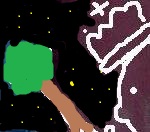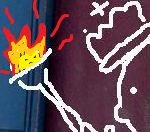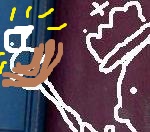Disclosure: Haven’t met the poet. For a lot of the book’s discussion of Madame Bovary and Eleanor Marx’s life I’m relying on the book’s own extensive endnotes. Please note that both the book and this review examine gendered inequality, the language of diminishment and gaslighting, and the language of emotional abuse. Thanks, as ever, to Muireann Crowley for her editing insight.
‘It won’t help if I tell you this but it might.’ (‘Mask’)
Review: Tara Bergin’s second collection begins with an epigraph from Marianne Moore: ‘What is more precise than precision? Illusion.’ The texture of The Tragic Death of Eleanor Marx is shot through by this Moore-like tension between arch, often stylised dramatic performance and powerful undercurrents of grief, solitude, anger. Speakers in Bergin’s poems correct, interrupt, repeat themselves, leave thoughts unspoken and incomplete, but there’s an inescapable sense that every revision, every ostensible misstep, is purposeful. Though the poems inhabit an impressive range of personae, settings, tones and lyric forms, it gradually becomes clear that not only are they working in concert, but their shared thematic roots run extraordinarily deep. The book is a unity, in the clearest possible sense. Though Marx’s biography, on a first reading, might primarily seem like a useful framing device, the circumstances of her life and death find echoes and touchstones throughout the collection.
As the book’s endnotes relate, Marx committed suicide shortly after discovering that Edward Aveling, her partner of fourteen years, had married his mistress in secret. Though the collection is bookended by episodes from Marx’s life and work, most of the book takes its setting in an indeterminate space between Marx’s contemporary moment and our own. One poem references the war in Afghanistan, another the Victorian rules regarding floral courtship. Bergin’s speakers, as the book’s epigraph indicates, take many guises (one poem is called ‘Mask’, others include ‘Drama Lessons for Young Girls’ and ‘Rehearsing Strindberg’, the book’s final word is ‘rehearsed’), only some of which seem to share qualities with the biographical poet. This indeterminacy is, I think, part of the what makes the book such a deeply discomfiting experience: the reader is not being guided thoughtfully through an imaginative space, the rules change, the guide changes, the handholds are unreliable. This gradually and often passively exhausting environment may well be part of the book’s dramatization of finding one’s means of understanding the world and the people around oneself unreliable.
The book’s first poems – ‘The True Story of Eleanor Marx’ and ‘The True Story of Eleanor Marx in Ten Parts’ – perform its first instances of (potentially misleading) self-correction, the first instance of a man checking and inhibiting a woman’s capacity for self-expression:
‘I’m not going to tell you anything
That my psychoanalyst wouldn’t tell you.
He too speaks in riddles.
He too proclaims we are all victims
Of our insurrections.
I will not stand up to him.’
There’s a hell of a lot going on here. The familiar idiom ‘I’m not going to tell you…’ takes on a secondary meaning, ‘I refuse to tell you’ or ‘I am not permitted to tell you’ what has not been officially sanctioned by a male authority figure. Coming back to these lines after reading the whole collection, the psychoanalyst’s proclamation of shared victimhood with Eleanor seems cruelly disingenuous, not least in light of her incapacity to resist his final say. The way this small, claustrophobic poem opens out into a story in ten parts, however, feels paradigmatic in a book that consistently pushes towards greater complication than accepted norms permit, grates against boundaries of perceived respectability. ‘The True Story of Eleanor Marx in Ten Parts’ also picks up a grim, deft comic tone that will continue throughout the book. The violence instigated by Edward Aveling’s cowardice and deference to social niceties, his desire for the markers of decency and rectitude afforded by marriage, is punctured by the wry humour of the narrative voice:
‘Eleanor of the eight-hour day
Gets betrayed by Edward of the two faces.
[…]
‘The Coroner is exasperated with feeble Edward. […]
Coroner: What was her age?
Edward: Forty.
(She was forty-three.)’
The question of how such a brilliant and courageous person could maintain a relationship with such a patently ‘feeble’ and thoughtless one seems to haunt the book. The word ‘cruel’ appears three times, in ‘Joseph’s Palms’, ‘Tamer and Lion’, and the final poem, ‘Bride and Moth’. On each occasion, it refers to a named male figure of romantic or sexual desire, all with predatory or violent connotations:
‘And for a moment
Joseph looked quite cruel,
I smelt the resin and the dust,
and felt a sudden, terrifying
lust.’ (‘Joseph’s Palms’)
‘Thomas, I won’t give up on you,
even though they are all saying that you are cruel and corrupt.’ (‘Tamer and Lion’)
‘What queer songs Green Peter sings –
but of course he is both attractor and deceiver:
I mean, he thinks they are the same thing. […]
What cruel songs Green Peter sings.’ (‘Bride and Moth’)
On the other hand, women are persistently referred to as ‘small’, ‘little’, ‘tiny’, ‘young’, often by themselves; the book again seems to recreate an environment in which the very language of one’s engagement with gender is rigged by design and subsequently internalised by those it harms most. On a technical level, the closing line break and rhyme in ‘Joseph’s Palms’ is stunning. The speaker’s response is not contextualised, excused or explained, and the reader’s response is directed only by our understanding of how this scene interacts with the book’s concerns at large. The rhyme of ‘dust’ and ‘lust’, its clear connection of violence, death and desire, is heartbreaking. The poem’s one-word closing line feels inescapable, despite the speaker’s identification of the threat Joseph poses. The way the poem binds its message with its form is characteristic of a book with an uncommonly keen sensitivity to rhyme. Though rhyme appears throughout the book, it almost never does so within a fixed scheme, more often one-off flourishes, sound-traps that take the reader off-guard. Take section nine of ‘The True Story of Eleanor Marx in Ten Parts’:
‘And in the offices in Maiden Lane,
There is a cupboard with two glass panes.
And there they place her to remain
For years and years.’
The heavy full rhymes make the first couplet seem almost fairytale in their simplicity; the third full rhyme feels jarring, like one harsh note too many, before the scheme and rhythm disintegrate into the fourth, shrugging, sighing line. It’s a minor point, and drawing this much attention is more than it was intended for, but one could analyse a dozen such moments and barely scratch the surface of what Bergin invests in the correspondences between sounds. Here’s ‘Tamer and Hawk’, maybe a companion piece to ‘Tamer and Lion’:
‘The bird is wired with little bells.
It won’t take fright:
it doesn’t want to hear the jingle-jangle,
does it?
No.
The tamer keeps the hood on.
That’s right.’
The skin crawls at the tamer’s odious faux-concern, his intricate means of control, his assumption of the hawk’s wishes, the real violence hidden by the infantilising ‘little bells’ and ‘jingle-jangle’. Like dust/lust in ‘Joseph’s Palms’, the full-rhyme ‘fright’/‘right’ draws an explicit line between fear and control, as well as formally enacting the poem’s drama. The poem’s title directs us back to ‘Tamer and Lion’, in which:
‘You have the ability to do great hurt, Thomas,
but you also carry within you a great hurt.
Don’t you?
I hope you do, Thomas.
I do.’
The asymmetry between ‘Tamer and Hawk’ and ‘Tamer and Lion’ is pointed. Where the hawk is entirely under the tamer’s control, the only thing we know for sure about the lion (or Thomas) is his ability and willingness to commit violence. It’s unclear whether the speaker in ‘Tamer and Lion’ is reiterating her hope that Thomas carries great hurt (and with it some hope that Thomas may be salvageable), or implying that the only hurt is carried within the speaker herself; ‘tamer’ begins to sound closer to ‘one who is more tame’ than ‘one who tames’. Bergin’s staging of these allegorical relationships is finely nuanced (the mind returns to Moore’s ‘precision’), and the proximity of their surface and subtextual meanings creates a highly charged atmosphere. That the poet manages these and several other comparable scenes with a lightness of touch, thematic consistency and imaginative generosity is part of what makes The Tragic Death of Eleanor Marx such an affecting experience.
The book just as often depicts narrators who have internalised social cues to self-correction and control; one of the poems’ repeated moves is in lines that almost repeat, but for a small alteration that changes everything:
‘For a young girl to dream –
For a young woman to dream
that she sees a horse in human flesh’ (‘To Dream of Horses’)
‘Violence is such a lovely word.
I think you’ll find I used it first –
I think you’ll find I heard it first.’ (‘Ode to the Microphone’)
These gestures leave the reader with a hazy impression of who these speakers might be, and what they truly want, or mean. Bergin seems to suggest that to obey codes of respectability is to suffer violence, that one’s expression is foreshortened by conventions so pervasive they are almost impossible to name, with only the cold comfort of maintaining an ostensible peace. The speaker in ‘Notes from the Sanatorium’ comes close to the bone when they mention, in passing, ‘I have always had far too much of myself in me.’ The line is close enough to the criticism ‘being full of oneself’ that the altered syntax almost passes unnoticed. This speaker is not full of themselves, but has too much self to be controlled. The sanatorium steps in as an institution for those who are ‘too much’.
Where Bergin’s female speakers self-correct, diminish and disguise their pain, the speaker in ‘The Method’ gives some of the book’s clearest and most direct expressions of personal intent, and the willingness to inflict harm:
‘Everything I do, I do in order to get something.
For example: Jane.
I want Jane, but she doesn’t want me.
Now, everything I do,
I do in order to get past the obstacles to Jane.’
The speaker clearly does not expect to be rebuked or corrected into a state of respectability. In fact, in the market of exchange established in ‘The Giving Away of Emma Bovary by Several Hands’, the speaker already exists within that state. There, Charles Bovary has made his intention to marry Emma Rouault clear to her father; the poem is six versions of the same line, from six translations of Madame Bovary:
‘If he asks me for her I’ll give her to him.
If he asks for her, he shall have her. […]
If he asks me I shall say yes.’
In both poems, it is perfectly acceptable to say in blunt terms that the humanity of the person being transacted is negotiable. In a book that fine-tunes the terms of its social interactions to such a keen degree, the simplicity of the spoken grammar in the poem becomes something almost childish, almost ludicrous in its shamelessness; and yet, as the poems about Marx make plain, extremely real.
If this makes The Tragic Death of Eleanor Marx sound heavy, an emotional battle, it absolutely is, and it would be a mistake to overlook or diminish exactly what Bergin is exploring with the book. But I also don’t want to misrepresent a book that is informed by an intensely energetic, creative, lucid sense of humour, a real joy to watch in action. In ‘Talking to Anne-Marie after the American Election’, a mundane office chat becomes a farce of almost parabolic significance, as the eponymous Anne-Marie reveals, ‘My name’s not actually Anne-Marie’:
‘And I said: But we’ve all been calling you Anne-Marie for years.
Everyone calls you Anne-Marie.
I know, she said. But it’s actually Anne. […]
Jesus, Anne-Marie, I said, I can’t see you as an Anne at all.’
The speaker can’t abide as minor an alteration to their sense of order as ‘not Anne-Marie but Anne’; how can they comprehend ‘the catastrophe’ of America’s reinvigorated white supremacy? That the speaker persists in calling their colleague ‘Anne-Marie’ is not only plain ignorance, but a kind of inability to acknowledge Anne’s agency; like so many characters in the book, the determining factor in the exchange is the whim of the interrogator. If the speaker ‘can’t see’ Anne, then Anne will simply not exist. Even in tonally comic pieces, The Tragic Death of Eleanor Marx doesn’t break its concentration for a second, doesn’t lose sight of the stakes underwriting every interaction.
This has already gone longer than I intended, and in honesty there’s so much left to pore over; the devastating dramatic gestures and rhetorical power of ‘Rehearsing Strindberg’ and ‘Drama Lessons for Young Girls’, the many brief, slight poems that hum with energy. The Tragic Death of Eleanor Marx asks extraordinarily difficult questions at an intensity of pitch and concentration that has to be read to be believed.
Further Reading: Interview with Tara Bergin for the Forward Arts Foundation
Paul Batchelor’s review of The Tragic Death of Eleanor Marx for The New Statesman
Chloe S. Vaughan’s review of The Tragic Death of Eleanor Marx for The Manchester Review
Nuar Alsadir on Clowning and the uncontrolled self for Granta






